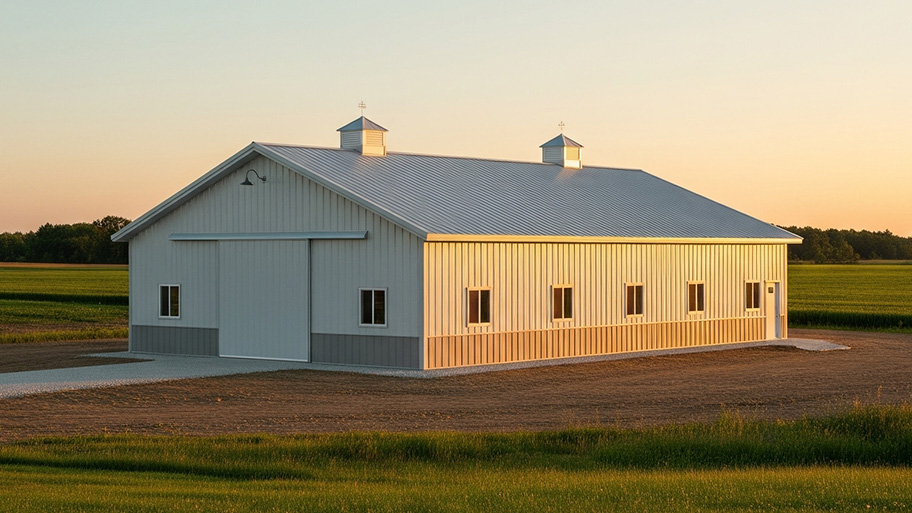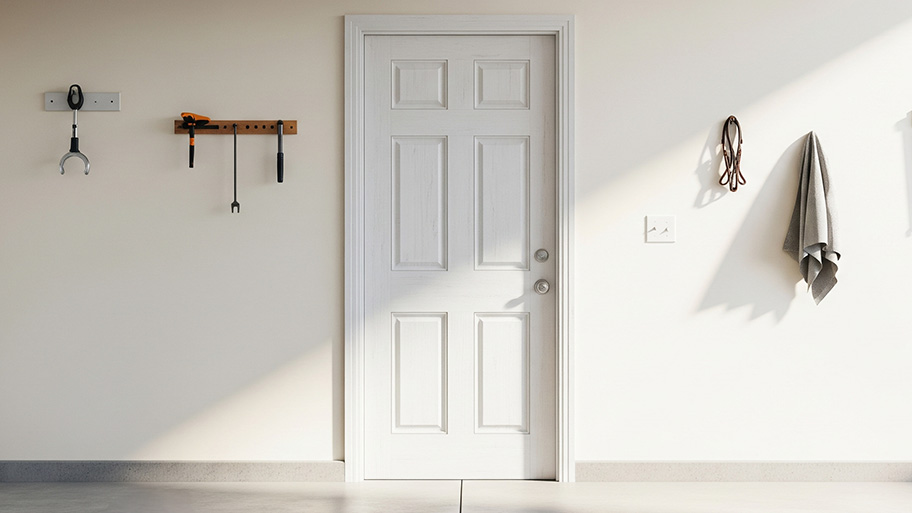
Want to revamp your garage and add some utility? Use this garage remodel cost guide to see what your project will cost before you get started.
Don’t guesstimate your garage size


Most two-car garages range from 20x20 to 30x30.
The cost to build a two-car garage is $30,000 on average
Your garage should have ample room to walk around and open car doors.
Consider adding square footage so you have space to build out storage.
It’s helpful to understand common two-car garage dimensions if you own two vehicles, or are simply interested in extra storage or workspace. Owning a garage comes with lots of perks—it helps protect your cars from messy weather and theft, and can also act as an extra space to house gym equipment, tools, or other miscellaneous items. But a two-car garage, as its name suggests, is designed to hold two cars at a minimum—so how large should it be? Learn how to calculate the right two-car garage dimensions to customize your space for your needs.
| Common two-car garage dimensions | Total Square Footage |
|---|---|
| 20x20 | 398 |
| 20x22 | 439 |
| 20x30 | 600 |
| 22x22 | 484 |
| 22x24 | 527 |
| 24x24 | 581 |
| 24x28 | 667 |
| 24x30 | 720 |
| 30x30 | 900 |
The dimensions of a garage should be at least 20-feet wide by 20-feet deep to allow enough room to comfortably park both cars and open doors into and out of the space, but this setup won’t leave much room for storage. Consider larger standard sizes if you plan on using your new garage to house more than just your vehicles. Even a few extra feet of depth will provide more wiggle room for shelves and boxes. Plus, a larger garage may add value to a home.
Your garage can be a place to hold several extraneous home items, like tools, gardening supplies, and seasonal decor; the more space you have, the better you can optimize this extra area.
The most common size for a two-car garage is 24 feet deep and 24 feet wide (measured by the interior width), but as car sizes are increasing, many garages now are upping the ante with larger dimensions like 30 feet by 30 feet in some cases. After all, the last thing you want is to realize your space is too small once it’s already completed—and the cost to extend a pre-existing garage can sometimes be higher than building a new one outright.
While these are the average garage sizes seen in most homes, if you have the option to customize the size of your two-car garage, you might wish to build something larger. 398 square feet (20x20) allows for two vehicles, each up to 6 feet wide and 18 feet long, but it won’t leave you much room for much else, such as storage.
The true minimum size of a two-car garage is 20 feet wide by 20 feet deep, but these dimensions barely leave enough space to open a door, let alone store anything other than cars. Folks may opt for such a setup if they only plan on parking one car inside and devoting the other spot strictly to storage or something else. Those who do intend to use both spaces for cars should strongly consider larger car dimensions, if only for ease of use.
How big are your cars? This is just one question to ask when considering the size of your two-car garage—you’ll also want to factor in storage space and the room you need to be more comfortable.
Start by measuring your cars—they’re the core items that need to be stored in your garage. You can estimate by using the average measurements below, but the reality is that car sizes have been increasing over the years, so a pickup truck built in the 90s might be much smaller than one you buy today. Proper, exact measurements are useful here.

The width of most cars is around 6 feet, but some cars, like the Tesla Model X, are larger, clocking in around 7.4 feet, with mirrors folded in. The width of a car can vary based on its safety features, such as side airbags and lane departure sensors.
Remember that once you know the width and length of your two cars, you’ll want to ensure your garage has enough room for the vehicles and space to open the doors comfortably and walk around easily. So to calculate how wide you need your garage to be, you’ll want to add the width of your two cars together and add about 3 feet (36 inches) to each side of the vehicle.
We end up storing several things in garage spaces—from workbenches to bicycles and even home gym equipment. When determining the dimensions of your future garage, take all of this into consideration, in addition to how large your cars are.
Once you have the size needed for your cars (with room to get in and out of them), add any additional floor space. Tack on 2 feet to the depth measurement for your shelving (so 4 feet, if your shelves are 2 feet deep, per side). You might also wish to have shelves on the rear wall, so factor this in as well.
If you wish to convert part of your garage into any other area, such as a laundry room, make sure you measure the appliances/items and leave room for yourself to walk and move around comfortably with your arms outstretched.
While ceiling space won’t affect garage floor dimensions, it can determine how tall your setup should be. A minimum height of 8 or 9 feet will provide enough space to install overhead shelves without interfering with an automatic garage door system or putting you at risk of bumping your head.
The width of a garage will also tell you how wide its door should be and whether it needs one or two. Single garage doors range from 12 to 20 feet wide. Two-car garages on the smaller side—like those that are 20 feet wide—can get away with a single door at the max size, but anything larger will need two doors or something customized. For example, two 12-foot wide single doors will fit perfectly on a 24-foot wide garage. Still not sure what to do? Talk to a local garage builder to get a professional opinion and estimate.
If you’re looking to expand your existing garage, the process will be much easier with an attached vs. a detached garage. If you are building from scratch as well, this is something to consider: do you think you’ll need more space down the line? Detached garages will offer you more flexibility if your needs change. That said, the cost to build a garage can rise significantly if you wish to build a detached one; on average, a detached garage costs $40 to $70 per square foot, which is around 10% to 15% more than the cost of building an attached garage.
A two-car garage costs between $14,500 and $40,300, with an average price of $30,000.
If you have a smaller budget, you may only be able to build an attached garage that fits your two cars with a little extra for storage. With a large budget, you could build a larger detached garage that leaves room for laundry facilities, two cars, and even a Peloton; customize without breaking the bank. Remember that adding insulation, drywall, lighting, and flooring to give your garage the option to become a living space later will boost your home’s resale value.
From average costs to expert advice, get all the answers you need to get your job done.

Want to revamp your garage and add some utility? Use this garage remodel cost guide to see what your project will cost before you get started.

The cost to build a shed depends on factors like size, material, type, and more. Learn how much it’ll cost to hire someone to build your new shed.

Discover the cost to build a pole barn, including average prices, key cost factors, and tips to help you budget and plan your project with confidence.

Wondering "Who can I hire to finish a garage"? You have options to turn your garage into a comfortable and useful space. Learn more.

Looking to add a garage to your property but aren’t sure what type of professional should complete the task? Use this guide to see who to hire to build a garage.

Fire-rated doors can help protect your home from a fire in the garage. Before you buy, read this guide to understand fire-rated doors and where to install them.